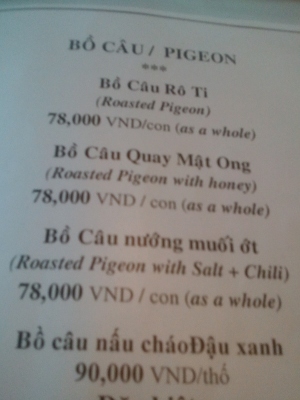By Alfred Tuinman
- 4 minutes read - 741 wordsEdited on March 21, 2023
Bon Apetite in Vietnam
My thigh muscles were aching for days afterwards. I had been crawling for some 100 metres through the Viet Kong tunnels at Củ Chi, north of Saigon. These escape routes from the American soldiers during the Vietnam war had been a bit widened and heightened for the tourists. Even though I still had to come across the first tall or fat Vietnamese, it was difficult to comprehend any human being able to manoeuvre himself through these.

Bon Apetite in Vietnam
I was on a business trip to Vietnam and Saigon had surprised me by its very commercial appearance, not to mention the millions of scooters. It was more Western in outlook than Mumbai. The gate to the former south Vietnamese presidential palace, once crashed by a north Vietnamese army tank and famously captured on film, had been restored to its former glory. I doubted that comrade Ho Chi Minh, whose bust is to be seen in almost every government building, would have approved of the nightclubs like “Apocalypse Now” or “Angelina”, or the shampoo saloons overcrowded with skimpily dressed girls suggesting that one may receive more than just a hair cut.
The day before I had visited a shipyard in Hai Phong, 100km eats of Ha Noi. I could clearly see that huge investments had been made. “It is privately owned” I was told by my pretty Vietnamese guide, struggling to pronounce the letter r. “It belongs to a relative of the minister” she added with a somber look that said it all. Any little doubt I might have had about the advantage of bamboo capitalism, socialist style communism, evaporated.
The average Vietnamese today is still very poor. I felt rich when I received a million from the local ATM ($50). The economy though is hitch-hiking on the success of its large neighbour China. Luckily Vietnam had the sense not to follow the North Korean model. It made me wonder about all the relatives of those people who had sacrificed their lives during the ‘American war’ as the Vietnamese refer to the ‘Vietnam war’. On both sides of the conflict, what had the people gained? I couldn’t help but think of very little. Corrupt politicians had been replaced by corrupt party members. Facebook is blocked but, unlike Singapore and some Gulf states, porn sites are freely accessible. Weird facts.
Corruption is no different though in India, the largest democracy in the world where 28% of sitting lower house members face (criminal) charges and where P.J.Thomas, chief of the national Vigilance Commission, himself didn’t have a particularly clean track record (involvement in an import scam). The latter was not an issue for the government but the Supreme Court thought otherwise and had ordered his dismissal.
After a long lull, this parliamentary season has been the season of the scams: the government tried in vain to refuse to set up a Joint Parliamentary Committee to look into the $40 billion odd lost in licensing of the 2G telecom spectrum, the fraudulent contracts surrounding the Commonwealth Games had put India to shame internationally, subsidy scams in Uttar Pradesh were exposed, and the reluctance to go after the black money in overseas accounts made the Supreme Court publicly wonder about the government’s intentions
To the delight of the general public the Supreme Court is displaying a healthy degree of judicial activism like the arrest of Hasan Ali Khan who is thought to have laundered $8 billion overseas. The amounts involved appear to grow in line with the economy. The blatant manner is which things are done at times is nothing short of amazing: 8 out of 10 companies involved in the 2G licensing operated from the same building in Mauritius.
Technology in general is steadily making processes such as land records and online tendering more transparent. The 2005 Right to Information Act is having its effect. Sites like ipaidabribe.com put the bureaucracy on the record. Ultimately the people decide at election time. Unfortunately it is at that time that the educated classes, frustrated with politics, often stay home and those who have been cajoled with gifts or plain cash vote for the goondas (hindi for thugs).
In its next five year plan India intends to spend a trillion dollars. I can feel the pain again. No, not the muscles from crawling through the VC tunnels, but but the thought that Indian politicians will be crawling their way up the Forbes list.